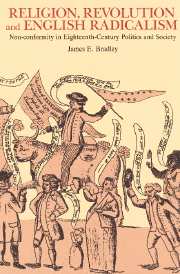 Religion, Revolution and English Radicalism
Religion, Revolution and English Radicalism Published online by Cambridge University Press: 29 October 2009
This study of religious influence on political behavior is based upon identifying single individuals by name in two or more discrete sets of vital, popular, or electoral records. In order to examine a person's political behavior over a span of several elections, it is necessary to link a number of originally unrelated documents and merge them into a single file. In those boroughs where a run of poll books or signed petitions have survived, along with the Dissenters' registers of births or burials, it is possible to identify politically active Nonconformists. Unfortunately, in numerous boroughs the data from the non-parochial registers was inadequate to provide any significant analysis. At Warwick, for example, there was a coercive address circulated with 212 signatures, and while three registers from the Dissenting chapels are available, the earliest register began in 1784 and listed only a handful of early entries. Conversely, at Lancaster the non-parochial registers were excellent, but the coercive petition had only thirty signatures. At Southampton, the absence of occupations in the non-parochial registers rendered it impossible to link the registers to the poll books, while at Coventry, the poll books lacked occupations. However, in this study the baptismal and burial recorders of Dissenters in twelve boroughs were sufficiently well kept to create extended panels or linked files combining registers with poll books or signed petitions and addresses.
Variations in surname spelling and the physical mobility of people from parish to parish have proved to be the two most intractable problems in computer assisted record linkage.
To save this book to your Kindle, first ensure no-reply@cambridge.org is added to your Approved Personal Document E-mail List under your Personal Document Settings on the Manage Your Content and Devices page of your Amazon account. Then enter the ‘name’ part of your Kindle email address below. Find out more about saving to your Kindle.
Note you can select to save to either the @free.kindle.com or @kindle.com variations. ‘@free.kindle.com’ emails are free but can only be saved to your device when it is connected to wi-fi. ‘@kindle.com’ emails can be delivered even when you are not connected to wi-fi, but note that service fees apply.
Find out more about the Kindle Personal Document Service.
To save content items to your account, please confirm that you agree to abide by our usage policies. If this is the first time you use this feature, you will be asked to authorise Cambridge Core to connect with your account. Find out more about saving content to Dropbox.
To save content items to your account, please confirm that you agree to abide by our usage policies. If this is the first time you use this feature, you will be asked to authorise Cambridge Core to connect with your account. Find out more about saving content to Google Drive.